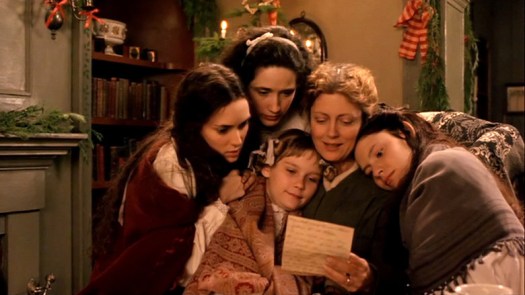The recent article in the Atlantic titled “The Lie of Little Women” by Sophie Gilbert (September 2018 issue) got me to thinking: when will someone step up and make a film about the real-life Jo March, Louisa May Alcott?
I am not talking about another documentary; the American Masters film made by Nancy Porter and Harriet Reisen was well done.
I mean a real, full-length, Hollywood-style movie.
1994 Winona Ryder film

In the Atlantic article, Gilbert referred to the much-lionized 1994 movie directed by Gillian Armstrong and starring Winona Ryder, writing,
“Robin Swicord, who wrote the screenplay, created virtually every line of dialogue from scratch, saying that she had imagined what Alcott might have written had she been “freed of the cultural restraints” of her time.”
And it lead me to wonder: why reinvent the wheel? Why not instead explore the creator of the original instead?
A life made for Hollywood
Louisa May Alcott was a woman ahead of her time who lead a most unusual, difficult, and even exciting life. Honestly, it bests any plot in her pot boilers. Think of the possibilities with these scenes (of which I plan on having a little fun):
- The patriarch of the family, somewhat of a religious fanatic, insists that his family join with group of eccentric strangers as a “consociate family” in a commune out in the middle of nowhere; they nearly starve and he suffers a breakdown.
 The Alcotts enjoy three happy years at Hillside where the basis of Little Women was laid. Louisa gets to hang out with Emerson and Thoreau, two men to whom she developed a strong attachment and even attraction, later featuring them as romantic leads in her first novel, Moods.
The Alcotts enjoy three happy years at Hillside where the basis of Little Women was laid. Louisa gets to hang out with Emerson and Thoreau, two men to whom she developed a strong attachment and even attraction, later featuring them as romantic leads in her first novel, Moods. The family is destitute in Boston as the mother, one of the city’s first social workers, struggles to keep the family afloat while the father goes awol. One sister has to work in NY to support them. Another does anything she can: writing, sewing, even hiring herself out as a servant to a gentleman with less than honorable intentions. The most quiet of the sisters enjoys a little romance only to suffer a breakdown after her mother sends him away.
The family is destitute in Boston as the mother, one of the city’s first social workers, struggles to keep the family afloat while the father goes awol. One sister has to work in NY to support them. Another does anything she can: writing, sewing, even hiring herself out as a servant to a gentleman with less than honorable intentions. The most quiet of the sisters enjoys a little romance only to suffer a breakdown after her mother sends him away.- The family huddles together in Walpole around this quiet sister, Lizzie, who nearly dies of scarlet fever.
- Oldest sister Anna meets her husband through the theatre.
- Louisa travels to Europe where she meets her Laurie (Laddie) and they enjoy fourteen days together in gay Paris, unchaperoned.
 Louisa serves in the Civil War as a nurse and nearly loses her life to illness.
Louisa serves in the Civil War as a nurse and nearly loses her life to illness.- After years of secretly penning pulp fiction, Louisa writes Little Women and enjoys a rags-to-riches story of her own.
- May becomes a professional artist and marries a man nearly 18 years her junior … etc., etc.
There is almost too much here to make one movie. If only we could interest an independent filmmaker …
All fun aside, Louisa May Alcott’s story is inspiring. We who dedicate so much of our time to reading her works and studying her life know this. She is timely. How can we get Hollywood to pay attention?
Enough Little Women reboots! Let an earthquake engulf the Marches. Let’s launch the Alcotts instead.
 Are you passionate about
Are you passionate about
Louisa May Alcott too?
Subscribe to the email list and
never miss a post!
Keep up with news and free giveaways
on Susan’s books,
Louisa May Alcott: Illuminated by The Message,
and River of Grace!
Facebook Louisa May Alcott is My Passion
More About Louisa on Twitter




I WOULD WATCH THIS FILM. 🙂
By all means! Start writing the script! Send it in, suggest a cast…it will be your hugest accomplishment!
I don’t know the first thing about writing a script. 🙂
You might surprise yourself. You’re a very talented writer who is passionate about the Alcotts! You already set forth a great outline!
“The most quiet of the sisters enjoys a little romance only to suffer a breakdown after her mother sends him away.”
Can you share more about this incident? I’m not sure I’ve ever heard about it!
Sure. I first found out about it in Harriet Reisen’s biography about Louisa. In 1853 Louisa made a quick reference in her journal about a little romance between Lizzie and a boy she referred to simply as “C;” he was a boarder at their home on Pinckney Street. It has been said that Abba did not approve and had the boy sent away. Sometime after Lizzie suffered a debilitating depression which her mother wrote to her father about. She called it a ” collapse of the brain.” Eventually Lizzie was able to pull herself out of it though I suspect she merely suppressed her feelings. I’ve often wondered if her depression was caused by her resenting her mother for sending the boy away and at the same time feeling intense guilt over that resentment since anger was not permitted in the family. Depression is, after all, anger inverted and directed towards the self. It has been said that in the chapter of Little Women called “Tender Troubles,” where Jo thinks Beth is hopelessly in love with Laurie was loosely based on this incident.
Wow, thanks! Interesting!
Oh yes, I do agree re: Jo saying, “Mercy on me, Beth loves Laurie!” This incident must also be the root for Beth finding invalidism later on. When she got to the point of thinking Anna was horrid and not letting Mother near her, it might have been a stubbornness in not wanting to get well, of not letting them control her, she might have wanted to get back at them in a passive-aggressive way…and no way was she going to get well and take over all the housework again…she was tired of being put upon and they could just bloody well do it themselves. Very likely, that 10 years after passing, Beth was a bit overdone in the book.
Actually I think Lizzie took pride in housework — Bronson had high praise for her domestic skills (which she would appreciate) and Louisa wrote of the delicious treats Lizzie would make for them. Lizzie would rather show rather than tell and the domestic work she did with such fidelity was her way of showing her love to the family. Even work we usually like can be tedious at times, just as Beth said with chapped hands.
As for Beth finding invalidism, I think Louisa wants us to think it found her. But, in Lizzie’s case, it’s more complex and I think the year 1853 (when the romance happened, and other things) was a year of critical mass for Lizzie.